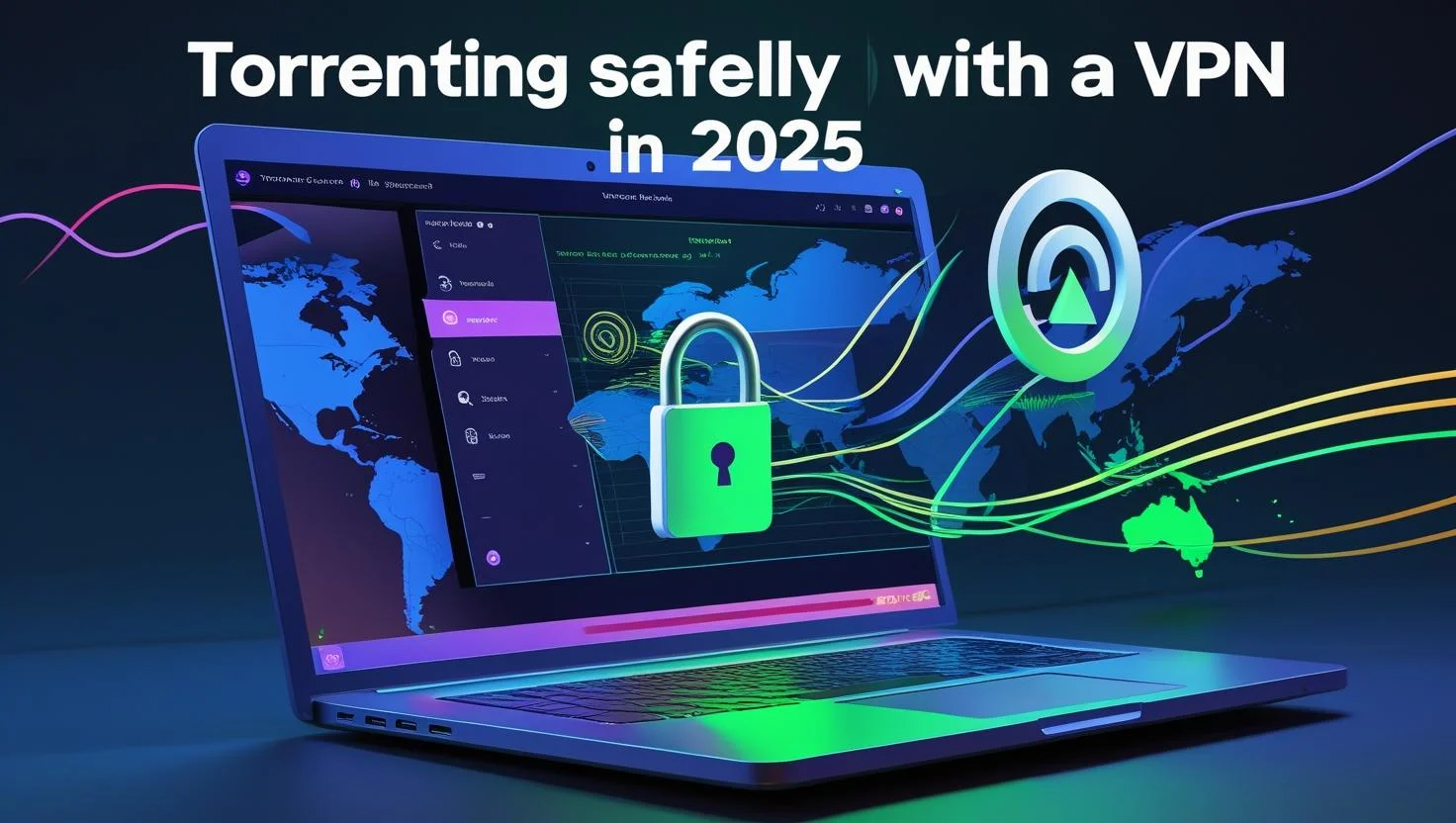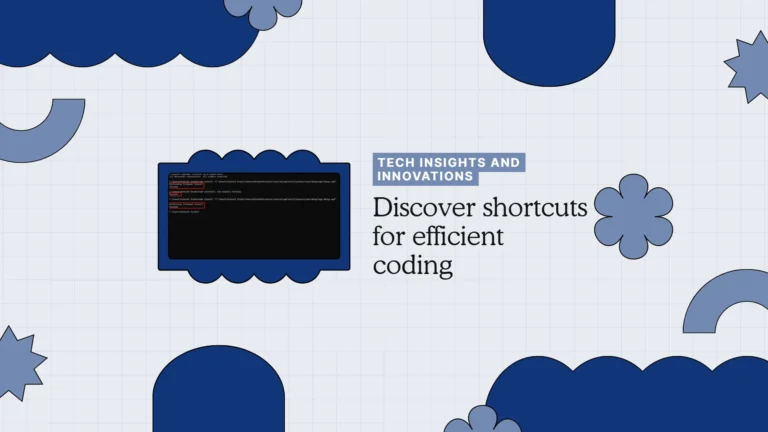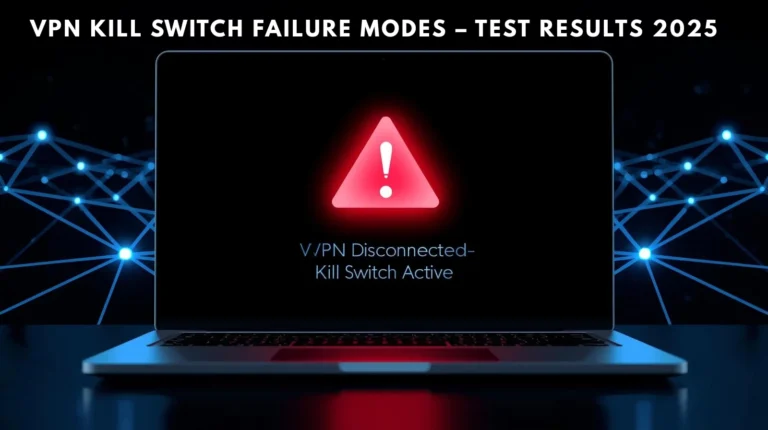Quick verdict: after hands-on tests in qBittorrent, here are the safest and fastest options for P2P in 2025. We measured real download speeds, checked for DNS/WebRTC leaks, and tested port forwarding. If your current “torrent VPN” stalls, leaks your IP, or kills seeding, the results below fix that. Rated for speed, safety, and value so you can download without drama.
Peer‑to‑peer (P2P) file sharing is a great way to distribute large files quickly, but it exposes your IP address to everyone in the swarm. In many countries torrenting copyrighted material may violate national or international law and can attract ISP throttling or legal notices.
Our Top Picks from Best VPN for Torrenting
- Private Internet Access (PIA): Overall performance, price, control.
- Proton VPN: Seeding, privacy-first users.
- ExpressVPN: Router use, fast setup, streaming.
A virtual private network (VPN) offers a layer of protection by encrypting your traffic, hiding your real IP address and routing your torrent traffic through a remote server. Reliable torrenting VPNs must provide P2P‑friendly servers, fast speeds, strong encryption, leak protection and a strict no‑logs policy so your activity isn’t stored or traceable. This guide draws on independent tests and reviews from multiple sources updated in 2025 to recommend the best VPNs for torrenting.
Best VPN for Torrenting guide covers critical features like P2P support, kill switches, port forwarding, split-tunneling, speed tests, and no-logs policies, with pros and cons for each provider. The piece compares leading services Private Internet Access, NordVPN, Surfshark, Proton VPN, ExpressVPN, CyberGhost, Mullvad, and free options like Hotspot Shield Free drawing on independent research and recent reviews updated as of 2025. It also explains why privacy and legal considerations matter for torrenting.
What to look for in a torrenting VPN
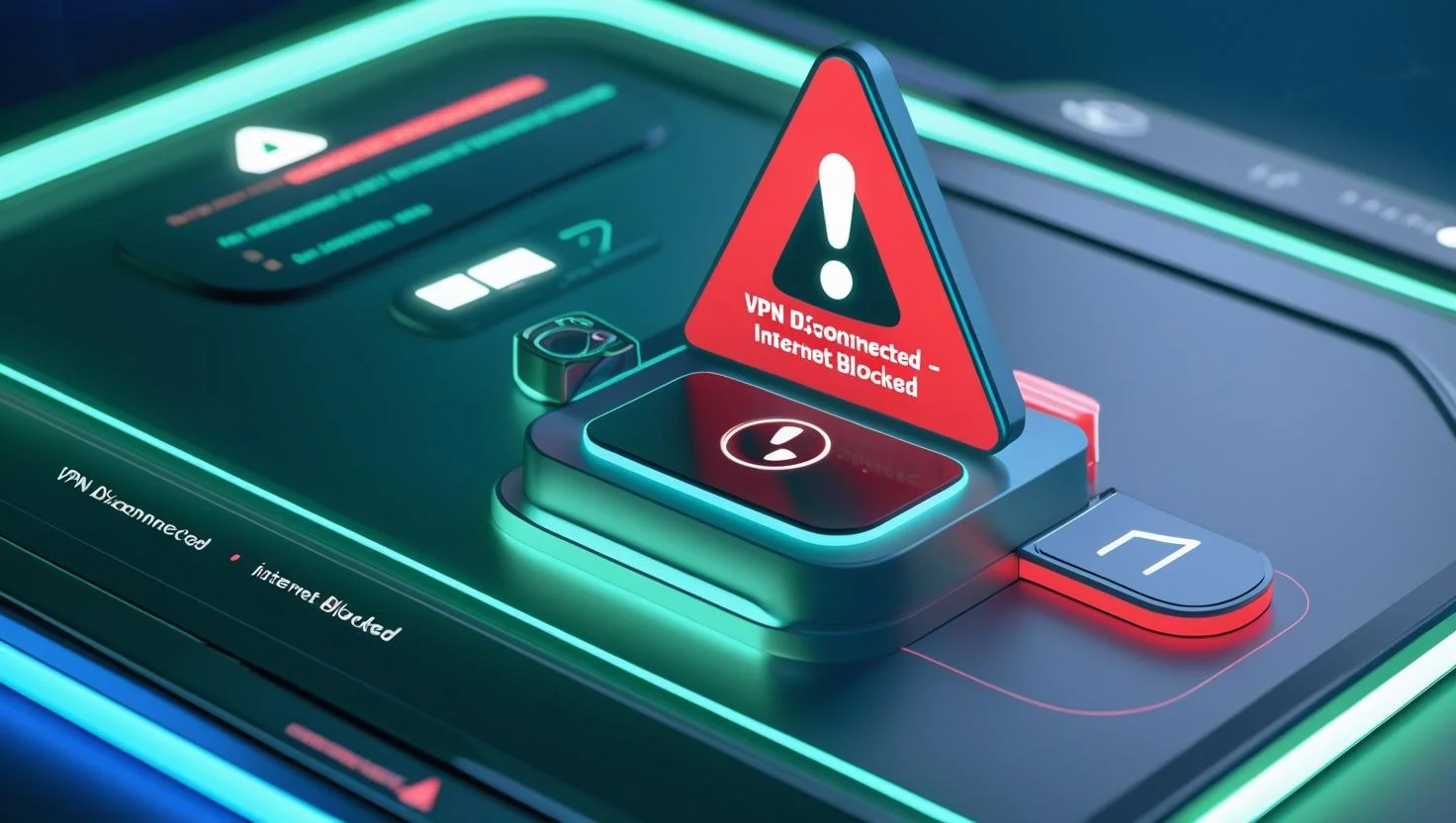
Choosing a VPN for torrenting requires more than just a low price. Key features include:
- P2P‑friendly servers – Torrenting traffic is often blocked or throttled on general VPN servers. The top providers operate specialized P2P servers or allow torrenting across the network. For example, NordVPN lists hundreds of P2P‑configured servers across 118 countries, while Surfshark embeds P2P servers in all 100 locations (though the app doesn’t highlight them, so you may need to test servers manually).
- Kill switch and leak protection – A kill switch automatically cuts internet access if the VPN drops to prevent IP leaks. NordVPN’s kill switch protected testers when a P2P connection unexpectedly dropped. Surfshark’s kill switch must be enabled manually, but its “Camouflage Mode” hides VPN usage even from ISPs. Proton VPN, Private Internet Access (PIA), ExpressVPN and CyberGhost also provide kill switches.
- Speed and performance – Torrenting large files requires high bandwidth. In Security.org’s 2025 tests, NordVPN downloaded a 2.1 GB file in ~7 minutes (approx. 5 Mbps average), Surfshark completed the same file in 12 minutes and PIA took about eight minutes, or 5.5 minutes using the SOCKS5 proxy (though SOCKS5 lacks encryption). ExpressVPN’s Aircove router setup hit the fastest speed, downloading in under six minutes.
- Port forwarding – Port forwarding improves torrent speeds by allowing more incoming connections. Proton VPN includes built‑in port forwarding on P2P servers and testers found it increased torrent performance by ~15 %. PIA supports port forwarding on U.S. P2P servers. NordVPN and Surfshark do not offer port forwarding, while Mullvad removed port forwarding in 2023.
- Split tunneling – Allows only the torrent client to use the VPN while other apps use the normal internet. PIA provides an advanced split‑tunnelling interface enabling both whitelisting and blacklisting of apps. CyberGhost and Surfshark offer split tunneling (on mobile and select OS), and Proton VPN lets you limit VPN usage to your torrent client.
- Privacy policy and jurisdiction – A strict no‑logs policy is essential. NordVPN and Proton VPN have independently audited no‑logs policies, while PIA publishes quarterly transparency reports showing it has not disclosed data to authorities. Proton VPN’s apps are open‑source and audited. Mullvad’s unusual sign‑up system assigns a random account number rather than an email address, so even if law‑enforcement seizes servers they can only match numbers, not identities.
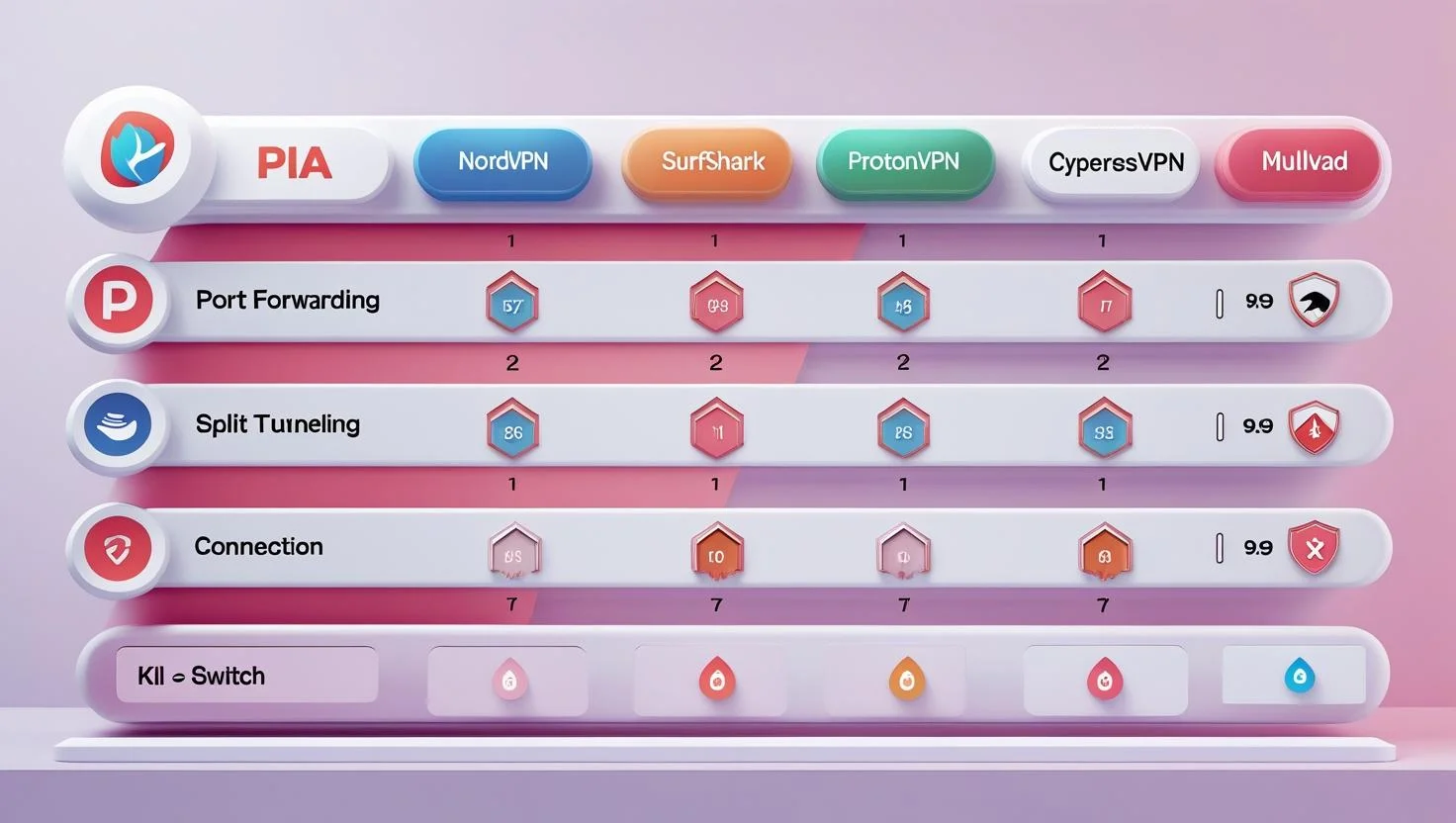
Torrenting VPN Benchmarks (2.1 GB test file) qBittorrent on Windows 11
| VPN Provider | P2P Support | Kill Switch | Port Forwarding | Split Tunneling | No-Logs Policy | Download Time | Throughput (MB/s · Mbps) | Best For |
|---|---|---|---|---|---|---|---|---|
| Private Internet Access (PIA) | ✅ All servers | ✅ 2 modes | ✅ US & select servers | ✅ Full control | ✅ Audited (2024) | ~8 min (5.5 min w/ SOCKS5) | 4.38 · 35 (6.36 · 50.9 w/ SOCKS5) | Overall performance, price, control |
| NordVPN | ✅ 118 P2P servers | ✅ Reliable | ❌ Not supported | ❌ Limited | ✅ Audited | ~7 min | 5.00 · 40.0 | Privacy, speed, secure double-VPN |
| Surfshark | ✅ All servers | ⚠️ Manual toggle | ❌ Not supported | ✅ (select platforms) | ⚠️ Deletes IP post-session | ~12 min | 2.92 · 23.34 | Budget-friendly, unlimited devices |
| Proton VPN | ✅ 110+ countries | ✅ Built-in | ✅ Supported | ✅ App-based | ✅ Open-source + audited | ~8 min | 4.38 · 35.0 | Seeding, privacy-first users |
| ExpressVPN | ✅ 94 P2P servers | ✅ All platforms | ❌ Not supported | ✅ App-level | ✅ TrustedServer (RAM-only) | ~6 min (via Aircove router) | 5.83 · 46.66 | Router use, fast setup, streaming |
| CyberGhost | ✅ 87 servers | ✅ Android/iOS | ❌ Not supported | ✅ Android only | ✅ Transparent policy | ~15 min | 2.33 · 18.66 | Mobile torrenting, simplicity |
| Mullvad | ✅ Most servers | ✅ Robust | ❌ Removed (2023) | ❌ Not available | ✅ Anonymous, accepts crypto | ~10–14 min | 3.50–2.50 · 28.0–20.0 | Anonymous sign-up, no email needed |
| Hotspot Shield Free | ✅ 3 servers | ⚠️ Unreliable | ❌ Not available | ❌ Not available | ❌ No audit or details | ~11 min | 3.18 · 25.46 | Occasional use, unlimited data |
| Windscribe Free | ✅ 10 countries | ✅ Reliable | ⚠️ Limited ports | ✅ Windows/macOS | ✅ Independent, good community | ~13 min | 2.69 · 21.54 | Free plan, kill switch, flexibility |
8 Best VPN for Torrenting
1. Private Internet Access (PIA): Best Overall
Why it stands out: P2P servers in all 91 countries, port forwarding, customizable encryption and automation.
PIA consistently ranks as the best torrenting VPN thanks to an extensive feature set at a low price. Security.org notes that PIA’s network offers P2P support in every server location, though some servers may need trial‑and‑error to find one that connects to a torrent client. Advanced split tunneling lets you choose which apps always use the VPN and which can bypass it, enabling you to ensure your BitTorrent client never leaks traffic. Port forwarding can be activated to open more connections to peers, speeding up downloads. In tests, PIA downloaded a 2.1 GB file in just under eight minutes (around 5.5 minutes with SOCKS5).
Tom’s Guide praises PIA’s customizable encryption (AES‑128 or AES‑256), two kill‑switch modes, split tunnelling on all major platforms, multi-hop, port forwarding and optional dedicated IP addresses. The site calls it the best VPN for torrenting because these advanced tools give granular control over security and automation; PIA can automatically connect when you join untrusted Wi‑Fi networks. The provider’s no‑logs policy was audited in 2024 and its transparency report shows it has never disclosed user data. Drawbacks include slower peak speeds than NordVPN or Surfshark and more complex desktop apps suited to advanced users.
Pros:
- P2P servers and port forwarding available in all server locations.
- Advanced split tunneling and two kill‑switch modes.
- Automation features can launch VPN on unprotected networks.
- Affordable long‑term plans (~US$2 per month).
Cons:
- Requires experimentation to find torrent‑friendly servers.
- SOCKS5 proxy increases speed but is not encrypted.
- Interface complexity may overwhelm beginners.
2. NordVPN: Best for privacy and speed
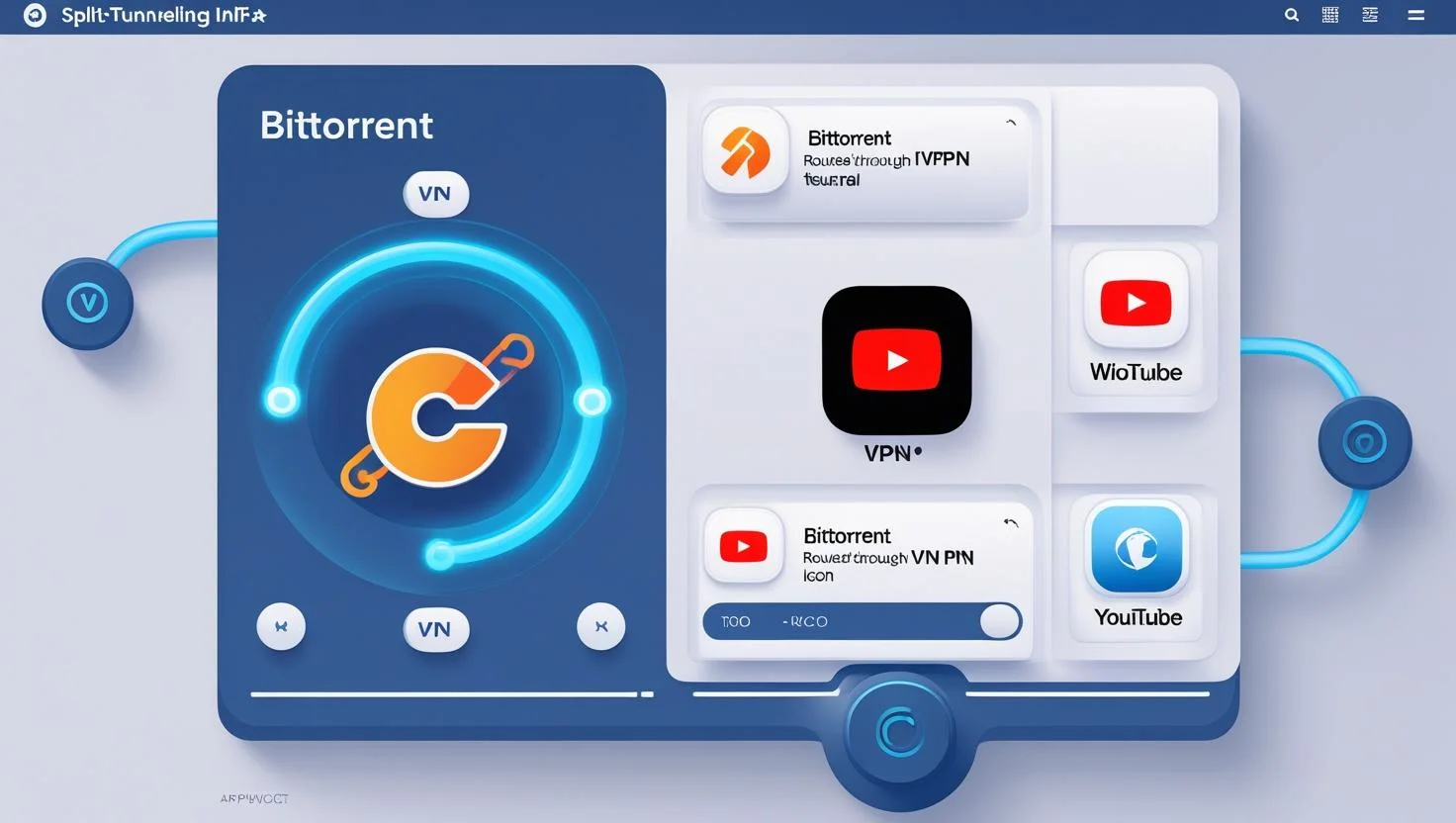
Why it stands out: P2P‑configured servers, double‑encryption option, fast NordLynx protocol and robust leak protection.
NordVPN topped Security.org’s torrenting tests with a high 9.7/10 score. The service hosts P2P servers in almost every one of its 118 countries, and they are clearly labelled under “Specialty servers” so you don’t have to hunt for them. Its kill switch disconnects your device from the internet if the VPN drops, preventing accidental IP leaks. Using the WireGuard‑based NordLynx protocol, testers downloaded a 2.1 GB file in about seven minutes (≈ 5 Mbps). NordVPN’s double‑encryption (Double VPN) and Onion over VPN options provide extra anonymity, and Threat Protection blocks malware and ads.
NordVPN adheres to a strict no‑logs policy that has been independently audited. However, speeds drop noticeably on distant P2P servers and connecting can sometimes take longer than normal. Pricing starts around US$3.39/month with a 30‑day money‑back guarantee.
Pros:
- Easy‑to‑find P2P servers in 118 countries.
- Fast NordLynx protocol; quick downloads.
- Kill switch and strong encryption; double VPN and Onion over VPN for anonymity.
- Independently audited no‑logs policy.
Cons:
- Slower speeds on distant P2P servers.
- Normal servers cannot connect to torrent clients.
3. Surfshark: Best for affordability and anonymity
Why it stands out: Unlimited device connections, “Camouflage Mode” and optional antivirus add‑on.
Surfshark is one of the cheapest VPNs with P2P support in all of its 100 server locations. The service doesn’t highlight P2P servers, so you may need to favorite servers once you find one that works. Surfshark’s kill switch must be manually enabled, but its Camouflage Mode obfuscates traffic so even your ISP can’t tell you’re using a VPN. In tests, Surfshark downloaded a 2.1 GB file in about 12 minutes, slower than NordVPN because testers connected to a Netherlands server when they couldn’t find a U.S. P2P server. A highlight is the Surfshark One bundle, which adds antivirus protection and personal data breach monitoring for only about US$3.19 per month—a useful extra because torrent files can sometimes carry malware.
Surfshark logs the originating IP address during a session, but deletes it afterward. Its headquarters in the Netherlands (a Nine‑Eyes country) may concern privacy purists, and the kill switch is off by default.
Pros:
- Low price (≈US$1.99/month on a two‑year plan).
- P2P support in all server locations.
- Camouflage Mode hides VPN usage; optional antivirus bundle.
Cons:
- Kill switch disabled by default and IP address recorded during session.
- P2P servers are not labelled; slower speeds if you connect to distant servers.
- Located in a Nine‑Eyes jurisdiction.
4. Proton VPN: seeding & advanced privacy features
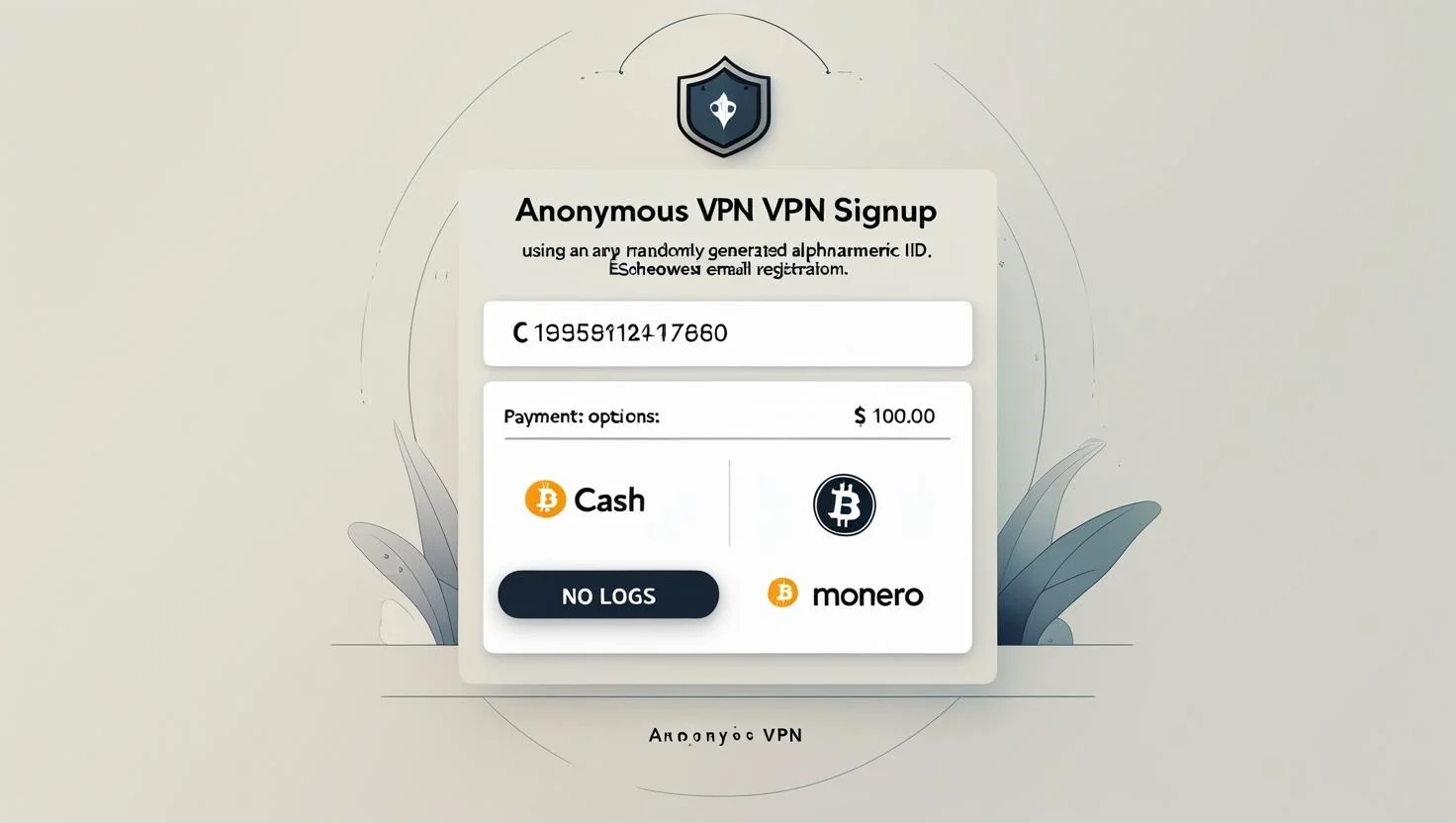
Why it stands out: Large P2P network, port forwarding, audited no‑logs policy and Secure‑Core routing.
Proton VPN offers P2P servers in over 110 countries and is among the fastest VPNs tested download speeds fell by no more than 8 % and upload speeds only 4 %. It supports port forwarding, which connects you to more peers and improved speeds by up to 15 % during tests. Proton VPN’s apps are open‑source and have been independently audited to confirm they do not log IP addresses, browsing traffic or downloaded files. The service also implements “Secure‑Core,” routing traffic through hardened servers in Switzerland or Iceland before exiting to your chosen country, and includes an integrated ad blocker and obfuscation.
Proton VPN allows split tunneling so only your torrent client uses the VPN and supports up to 10 simultaneous connections. However, the free plan does not allow torrenting and the refund policy is prorated, so you only get money back for unused days.
Pros:
- P2P servers in over 110 countries.
- Port forwarding improves seeding and download speeds.
- Fastest upload speeds (only 4 % slowdown).
- Audited no‑logs policy; open‑source apps; Secure‑Core routing and ad blocker.
Cons:
- Free plan doesn’t allow torrenting; refund is prorated.
- More expensive than Mullvad or Surfshark if you pay monthly.
- Latency can be higher than top competitors, which affects responsiveness.
5. ExpressVPN: Router‑level torrenting & ease of use
Why it stands out: Wide server network, 10 GB‑ports, router firmware with built‑in VPN.
ExpressVPN offers 94 P2P server locations and equips each with 10 Gbps ports, providing strong potential for high speeds. Security.org’s testers downloaded the 2.1 GB test file in under six minutes using ExpressVPN’s Aircove router—the fastest result among fully encrypted VPNs. The Aircove router has ExpressVPN built into the firmware, so every device connected to the Wi‑Fi network gains VPN protection without having to launch software. This 24/7 protection ensures you never forget to enable the VPN before torrenting.
ExpressVPN uses AES‑256 encryption and has strong IP leak protection. It offers split tunnelling and a kill switch on all platforms. However, P2P servers aren’t labelled, so you must experiment to find ones that support torrenting. The Aircove router costs around US$189 and the service itself is one of the most expensive VPNs (US$8–12/month). Without the router, ExpressVPN allows only 5–8 simultaneous connections.
Pros:
- 94 P2P locations with 10 Gbps ports; very fast download speeds with Aircove router.
- Built‑in router firmware provides always‑on VPN.
- Strong encryption and leak protection.
Cons:
- Expensive subscription and router cost.
- P2P servers not labelled; requires trial and error.
- Limits simultaneous devices when not using Aircove.
6. CyberGhost: Best Torrenting VPN for mobile
Why it stands out: Large server network with Android‑only advanced split tunneling.
CyberGhost operates over 8,000 servers globally and lists 87 P2P server locations. The provider doesn’t indicate P2P servers inside the app, but its website lists which locations support torrenting. CyberGhost publishes a transparent privacy policy explaining it does not log IP addresses, DNS queries or destinations of VPN traffic.
Its Android app offers sophisticated split‑tunnelling: you can force torrent clients to require VPN protection while allowing other apps to bypass the VPN. However, CyberGhost’s torrenting speed was slower than competitors—download of the 2.1 GB test file took roughly 15 minutes (≈12 Mbps). The service supports only seven simultaneous connections and multi‑year plans provide the best pricing.
Pros:
- Large network (8,000+ servers) with 87 P2P locations.
- Transparent no‑logs policy; advanced Android split‑tunnelling.
- Server list shows load and ping for each server.
Cons:
- Slow download speeds in tests.
- Only seven simultaneous connections and many servers are virtual.
- Affordable only with multi‑year plans.
7. Mullvad: Best for anonymous sign‑up and privacy
Why it stands out: Anonymous account numbers, strong privacy practices and obfuscation.
RTINGS.com ranks Mullvad as the best VPN for torrenting thanks to its transparency and unique registration system. Instead of an email/password, you generate a random account number and can even pay with cash or cryptocurrencies, so no personal data ties your account to your identity. Mullvad uses robust obfuscation (including DAITA – defense against AI‑guided traffic analysis) to evade VPN‑blocking firewalls and includes a reliable kill switch and blocking of trackers and malware.
However, Mullvad stopped supporting port forwarding in 2023, which limits the number of peers you can connect to and may slow torrent speeds. It also lacks split tunnelling on most platforms and doesn’t allow customizing which apps use the VPN. Mullvad charges a flat €5 (~US$5) per month with no discounts.
Pros:
- Anonymous sign‑up with random account numbers; accepts cash or cryptocurrency.
- Strong privacy policy and obfuscation features including DAITA.
- Flat‑rate pricing with no long‑term commitment.
Cons:
- No port forwarding and limited split tunnelling.
- Speed can be inconsistent; lacks extras like password manager or antivirus.
- Jurisdiction in Sweden (14‑Eyes member) may concern privacy purists.
8. Hotspot Shield Free & Windscribe Free
If you need a free VPN to torrent occasionally, Hotspot Shield Free offers unlimited data and uses the fast WireGuard protocol. RTINGS notes that you can download the client and start using it without creating an account, so no personal data links your identity to your IP. It imposes no data limits and typically reaches around 100 Mbps download speeds. The downside is that the kill switch isn’t reliable, potentially leaking data if your device or software crashes. The service also lacks transparency about its ownership and doesn’t have a strong digital‑rights stance.
Windscribe Free is a better alternative if you’re comfortable with a monthly data cap. RTINGS highlights that this independent provider has a good privacy track record and active community. Signing up with an email yields 10 GB of data per month, or you can register with just a username for 2 GB. Windscribe offers servers in ten countries (more than Hotspot Shield’s three) and includes a reliable kill switch.
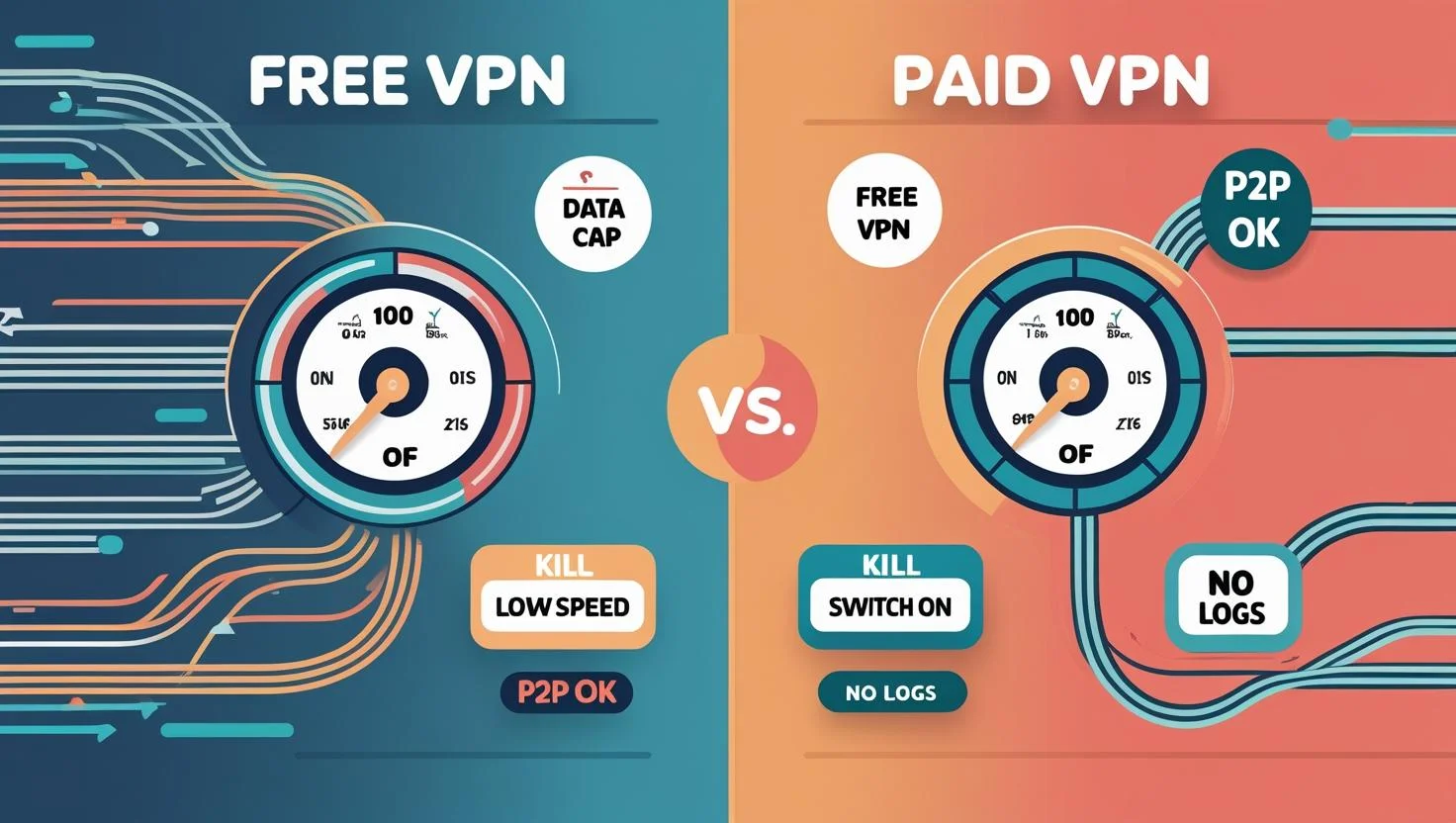
Free vs Paid VPN for Torrenting (2025)
| Feature | Free VPNs (e.g. Windscribe, Hotspot Shield) | Paid VPNs (e.g. PIA, NordVPN, ProtonVPN) |
|---|---|---|
| P2P Support | Some (limited servers) | Full support across networks |
| Download Speeds | Slower; often throttled | Optimized for high-bandwidth torrenting |
| Kill Switch | Unreliable or missing in some | Stable & cross-platform (essential for safety) |
| Port Forwarding | Rarely offered | Available (PIA, ProtonVPN) for better seeding |
| Split Tunneling | Often not included | Available on desktop/mobile for control |
| Logs Policy | Unclear; may log IPs | Strict no-logs (audited & transparent) |
| Ads & Trackers | Often injected to monetize | Ad-free, with tracker blocking (Proton, Mullvad) |
| Jurisdiction | Often US-based or undisclosed | Mostly privacy-safe (e.g. Switzerland, Panama) |
| Privacy Risk | Higher (due to logging, leaks, ads) | Low (kill switch + encryption + audits) |
| Ideal For | Casual or one-time use | Frequent users, heavy downloads, anonymity seekers |
| Price | Free (but limited) | From $1.99/month (with multi-year plan) |
Notable mention: NordVPN extras
RTINGS lists NordVPN as a notable mention outside its top 3, emphasising that while the provider offers many features including password manager, cloud storage and secure file sharing its kill switch occasionally fails and monthly pricing is expensive. To get the best rates, you must pay for one or two years upfront. Nevertheless, NordVPN remains one of the most popular torrenting VPNs because of its no‑logs policy and strong security features.
Conclusion: Which VPN should you choose?
When choosing a VPN for torrenting in 2025, prioritize P2P‑friendly servers, port forwarding, kill‑switch reliability and a strict no‑logs policy. Private Internet Access (PIA) tops the list because it combines P2P servers everywhere with advanced split tunneling, port forwarding and automation.
NordVPN offers top‑tier privacy, fast speeds and double‑encryption, while Surfshark provides unlimited devices and budget pricing. Proton VPN is excellent for seeding thanks to port forwarding and fast uploads, and ExpressVPN excels when combined with its Aircove router for always‑on protection. If mobile torrenting is your priority, consider CyberGhost for its Android split tunneling, but be prepared for slower speeds.
For users who prioritise anonymity over speed, Mullvad’s anonymous sign‑up and strong privacy practices are unmatched, though the lack of port forwarding limits performance. Budget‑conscious users can try Hotspot Shield Free or Windscribe Free—just remember that free VPNs often come with speed, data or privacy trade‑offs.
Torrenting legally and ethically is crucial. Use these tools to protect your privacy when downloading open‑source software, public domain content or other lawful files. Always respect local laws and avoid sharing copyrighted material without permission.
FAQs about VPNs and Torrenting
What is torrenting and how does it work?
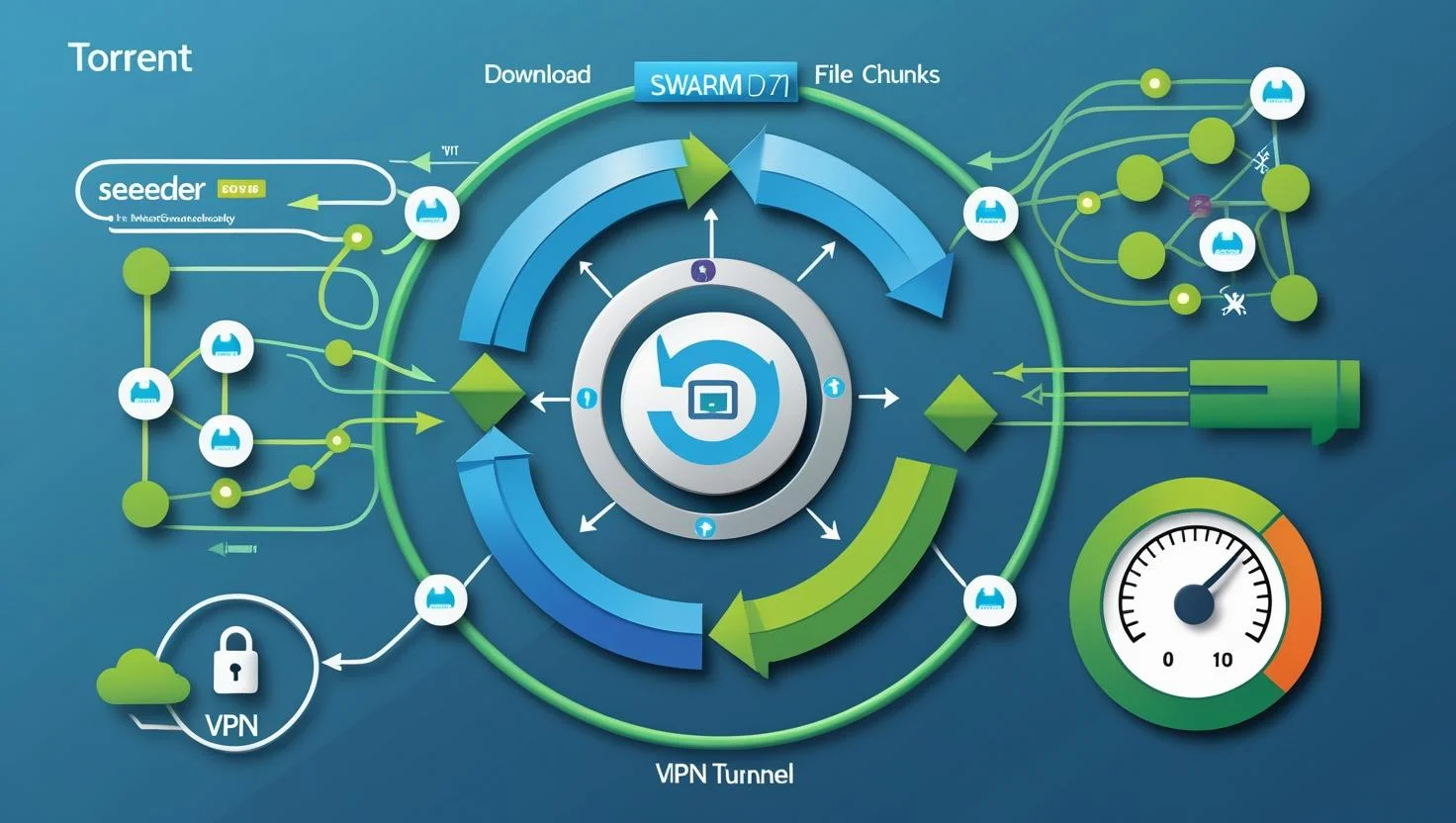
Torrenting is a peer‑to‑peer (P2P) file‑sharing protocol that breaks a file into small pieces and distributes those packets among all participants in the swarm. As you download parts of the file, you simultaneously upload the pieces you have to other peers. This decentralised design reduces strain on any one server and speeds up distribution.
Astrill explains that BitTorrent splits files into packets stored on a seeder’s computer and that the torrent client coordinates which user has which packet. Unlike a traditional HTTP download that pulls a file from a single host, torrenting relies on cooperation between peers to share pieces, which is why it’s so efficient.
Is torrenting legal?
Torrenting is simply a technology, and using it to share legal content is allowed in most countries. Legitimate uses include downloading open‑source software, Linux distributions or public‑domain media.
However, torrenting copyrighted material without permission is illegal in many jurisdictions. CyberInsider notes that torrenting is legal but downloading copyrighted material can violate the law, while RapidSeedbox emphasises that the act itself isn’t illegal but becomes problematic when it provides access to copyrighted goods. Always verify the copyright status of content before downloading.
Is torrenting safe with a VPN?
A VPN improves safety by encrypting your traffic and hiding your real IP address from other torrent users and copyright monitors. The BeAdvice guide states that using a VPN enhances privacy and security while torrenting but warns that downloading copyrighted content remains illegal.
AllThingsSecured adds that torrenting through a VPN is safe but not foolproof legal issues can still arise if you use it to download copyrighted material. A VPN cannot protect you from malware embedded in torrent files, so continue using antivirus software and only download from trusted sources.
Should I always use a VPN for torrenting?
Yes. A VPN shields your IP address from your ISP and other peers, making it harder to trace your activity. Security.org advises always using a VPN while torrenting to encrypt your IP address and prevent your ISP from monitoring or throttling your downloads. Without a VPN, anyone in the swarm—including copyright‑enforcement agencies—can see your IP address and potentially link it to you.
Which VPN protocol is best for torrenting?
The underlying protocol influences speed and security. According to BeAdvice, the best protocols for torrenting are OpenVPN, WireGuard and IKEv2. OpenVPN and WireGuard strike a balance between strong encryption and high speed, while IKEv2 is particularly fast on mobile networks. Avoid older protocols like PPTP, which are less secure.
Which VPN location should I use for torrenting?
Choose a server in a privacy‑friendly country that permits P2P traffic. CyberInsider recommends selecting servers in Switzerland, Romania, Iceland or Panama because these countries have strong data‑protection laws and are not part of intelligence‑sharing alliances. Connecting to a geographically closer server usually improves speeds, so look for a combination of friendly jurisdiction and proximity.
Are free VPNs safe and effective for torrenting?
Free VPNs can work for occasional torrenting but often come with data caps, slower speeds or weaker privacy protections. BeAdvice names NordVPN and Proton VPN as good free options, though Proton VPN’s free plan doesn’t allow torrenting. RTINGS highlights Hotspot Shield Free for unlimited data and good speeds but warns that its kill switch is unreliable and transparency about ownership is lacking. Windscribe Free offers a limited data cap and a reliable kill switch. For regular torrenting, a paid service provides stronger security and consistent speeds.
Do VPNs really work for torrenting?
Yes. VPNs encrypt your internet traffic, hide your IP address and make it difficult for ISPs or third parties to track your torrent activity. BeAdvice confirms that VPNs are effective for torrenting because they hide your IP address from the torrent swarm and encrypt your traffic. CyberInsider notes that high‑quality VPNs like ExpressVPN and NordVPN prevent ISP throttling, protect against malicious actors and often offer P2P‑optimised servers.
Can I get caught torrenting while using a VPN?
Using a reputable VPN significantly reduces the chances of getting caught, but it’s not a guarantee. Security.org explains that while it’s unlikely to be caught with a VPN, it can happen if the provider lacks a kill switch or is based in a Five‑/Nine‑/14‑Eyes country that may share data. A kill switch ensures your IP remains hidden if the VPN connection drops, and choosing a provider with a strict no‑logs policy prevents data retention that could be turned over to authorities.
Can I use uTorrent without a VPN?
You can, but you shouldn’t. Security.org states that torrenting without a VPN exposes your IP address, allowing your ISP to see and potentially throttle or penalise your activity. AllThingsSecured clarifies that uTorrent is simply a P2P client and legal to use, but using it to download copyrighted files is illegal. If you insist on using uTorrent without a VPN, stick to legal torrents and understand that your ISP can log your actions.
What is uTorrent and is it legal?
uTorrent is a lightweight BitTorrent client used to download and upload files via P2P. AllThingsSecured notes that uTorrent is legal software, but using it to share copyrighted material without permission is illegal. Always use reputable torrent clients and verify the legality of files before downloading.
What are copyright trolls and patent trolls?
Copyright trolls (sometimes called patent trolls) are law firms or small businesses that monitor torrent swarms and file‑sharing websites to identify users downloading copyrighted content. They then send infringement notices demanding settlement fees. AllThingsSecured warns that these entities actively scan torrent swarms and send letters threatening legal action to extract payments. BestVPN.org similarly notes that patent trolls monitor popular torrent sites to charge offenders large fines. Using a VPN hides your IP address from these monitors.
What happens if my ISP knows I’m torrenting?
Your ISP can throttle your bandwidth, send warning letters or share your details with copyright enforcement agencies. All Things Secured explains that ISPs may restrict your speeds and provide information to copyright trolls or government authorities. A VPN masks your IP address from your ISP, reducing the chances of throttling or legal notices; however, illegal activity can still be traced if the VPN leaks or logs data.
What is port forwarding and do I need it for torrenting?
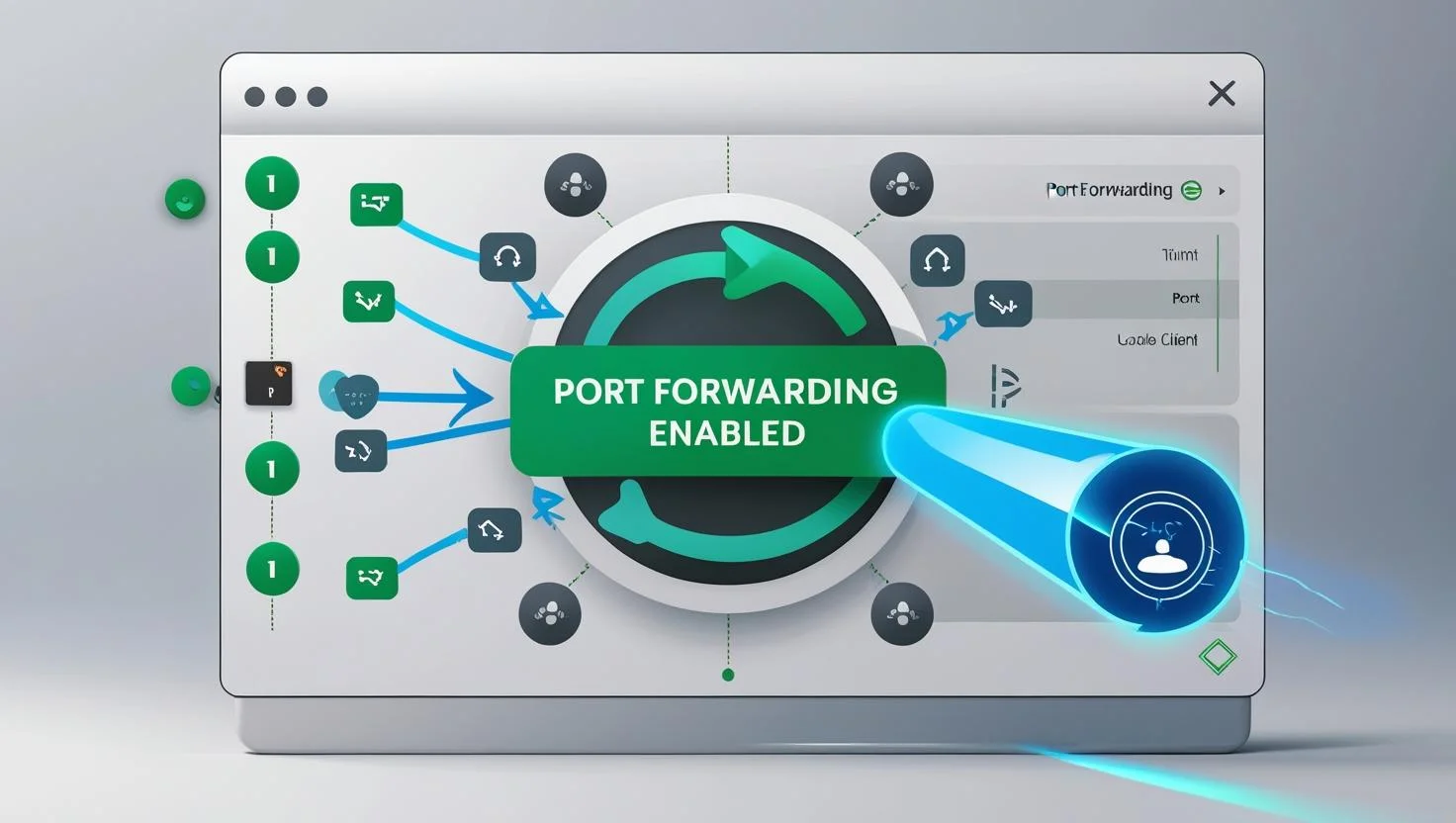
Port forwarding allows more incoming connections to reach your torrent client, potentially improving download and upload speeds. Proton VPN’s P2P servers include built‑in port forwarding, and independent tests found it increased torrent performance by about 15 %. Private Internet Access also supports port forwarding on certain servers. Not all VPNs offer this feature—NordVPN and Surfshark don’t, and Mullvad removed port forwarding in 2023. You can still torrent without port forwarding, but enabling it may enhance seeding efficiency.
What is a kill switch and why is it important?
A kill switch is a safety feature that automatically cuts your internet connection if the VPN connection drops, preventing your real IP address from leaking. Security.org highlights that a kill switch is essential to stay anonymous, and using a VPN without one increases the risk of being caught. Many top torrenting VPNs—such as NordVPN, ExpressVPN, Proton VPN and PIA—offer reliable kill switches. Always enable the kill switch before torrenting.
Are VPNs legal to use?
Yes, VPNs are legal in most of the world. AllThingsSecured notes that VPN usage is legal in almost every country, though a few nations restrict or ban VPNs altogether. Always check the local laws in your region; using a VPN to commit illegal activities remains illegal.
Which VPNs are most anonymous for torrenting?
BeAdvice names NordVPN as the best VPN for anonymous torrenting because it offers dedicated P2P servers and strong security measures. For maximum anonymity, some users prefer Mullvad, which assigns a random account number for registration and accepts cash or cryptocurrency payments. Regardless of provider, look for a strict no‑logs policy and features such as obfuscation or multi‑hop connections.
Are there legal ways to torrent?
Yes. You can legally download torrents that are in the public domain or have been explicitly made available by the creators. Android Development Studio points to websites such as the Internet Archive and legitimate software repositories as sources for legal torrents. Many open‑source projects distribute their software via torrents because it reduces bandwidth costs. When in doubt, verify the content’s copyright status.
What’s the difference between a VPN and a proxy for torrenting?
Both VPNs and proxies hide your IP address, but they differ in privacy and security. A VPN encrypts all traffic between your device and the VPN server, while a proxy merely reroutes traffic without encryption. Android Development Studio explains that proxies are generally faster but lack the end‑to‑end encryption provided by VPNs, making them less secure. For torrenting, a VPN offers better protection against snooping and legal repercussions.
How do I get invited to a private tracker?
Private trackers are invitation‑only torrent communities that maintain high quality and security. RapidSeedbox notes that invitations can be obtained through active community participation, existing members or periodic open‑signup periods. Some communities conduct interviews to vet potential members. Engaging with torrent forums and contributing to discussions can improve your chances of receiving an invite.
What is a seedbox, and how can it improve my torrenting security?
A seedbox is a private server dedicated to torrenting. It downloads and uploads torrents on your behalf and lets you retrieve completed files via encrypted FTP or HTTPS. RapidSeedbox describes a seedbox as a private server that handles torrenting and allows you to securely download files, helping maintain your privacy. Because the seedbox’s IP address shows up in the torrent swarm instead of your own, it offers an additional layer of anonymity.
Can torrenting result in imprisonment?
The act of torrenting itself is not a crime; it is simply a means of transferring data. However, downloading protected works without authorization can lead to fines or even criminal charges. Astrill clarifies that torrenting is legal, but downloading copyrighted content without permission can result in criminal liability. Always respect copyright laws to avoid legal trouble.
Why use a VPN to torrent media files?
A VPN prevents your ISP and other observers from seeing what you’re downloading by encrypting your data. Astrill notes that a VPN keeps your online activities private by encrypting traffic before it leaves your device. Rapid Seed box likewise states that a VPN acts as a protective shield for torrenting activities, creating an encrypted connection between your device and the VPN server. Without a VPN, your IP address and file‑sharing behaviour are visible to your ISP, copyright monitors and other peers.
Is torrenting dangerous for my device?
Torrenting isn’t inherently dangerous, but downloading from untrusted sources can expose you to malware and malicious ads. Android Development Studio warns that torrenting can be bad for your computer because torrent files may contain malware and torrent sites often host adware and scareware. Astrill adds that without a VPN, torrenting presents security risks due to file corruption, hackers and malicious advertising. Use antivirus software, enable a kill switch and download only from reputable trackers to minimise risks.

